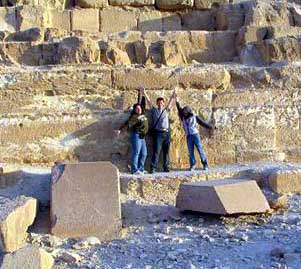Semester at Sea Fall
2006 Voyage 
- Home Page
- My Biography
- Shipboard Interview
- Japan: They are
Japanese, not Esenapaj, you Nacirema!
- Vietnam: A War, Not a Country
- Burma: Oppressed by
Too Much Talk of Oppression
- India:
Transnationalizing Marriage
- Egypt:
True Wealth of Knowledge
- Turkey: Serendipity
in Istanbul
- Croatia: It's a Small World After
All
- Multisited Ethnography Project: It's a Small World After All
- Open Letter
True Wealth of Knowledge
|
|
|
|
Forty
five minutes of being hassled by merchants, sexually harassed by
children who
enjoyed cutting off our path by biking in front of us, dodging reckless
drivers
that drove lawlessly, stared, heckled and “welcomed to
We
managed to talk about everything from his work, intimate questions
about
religion, war and peace to even the meaning of life! Amir works at the
As
Farha Ghannam mentions in her book “Remaking the Modern”, my unexpected
encounter with strangers certainly “enriched, in ways that I had not
anticipated beforehand my understanding of daily practices and
struggles” (8). Through
participant observation, I was able to see another different part of a
Middle
East that the
Ghannam
also talks about encountering a rich community that warns her not to
visit the
poor sections of society, which they see as the “Other”, and perceived
as “drug
dealers, criminals, troublemakers, and most recently, fundamentalists
and
terrorists” (5). Regardless of these cautions and her fears of being
discriminated
as a foreigner, Ghannam travels to the poor area and meets accepting
people who
she befriends. Her anecdote reinforced the idea that ignorance and
stereotypes,
created by looking at a region through the eyes of another without
visiting the
place for oneself, can be dispelled through meeting local people and
learning
from them. I experienced this through conversations with Amir, which
dispelled
propaganda and stereotypes of Western media that Muslims are Islamic
terrorists.
My
walk in the city showed me how much value there is in talking to
people, even
if it means committing a tourist crime of not going to the main
attractions of
a place, deemed by the tourist industry as “must not miss, or miss
out.” The
encounter with Amir was valuable for a multitude of reasons. I was
reminded
that visiting a country without meeting the locals steals away from an
experience because the locals are prisms of truth, knowledgeable about
their
country in an intimate and real way, because they live it everyday.
Talking to Amir
had provided me with more education than what one of the biggest and
most
impressive libraries in the world could ever offer.
